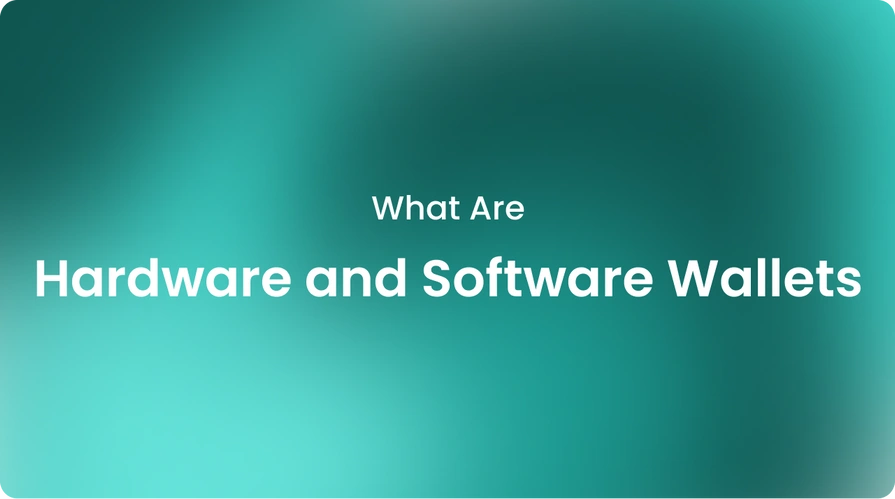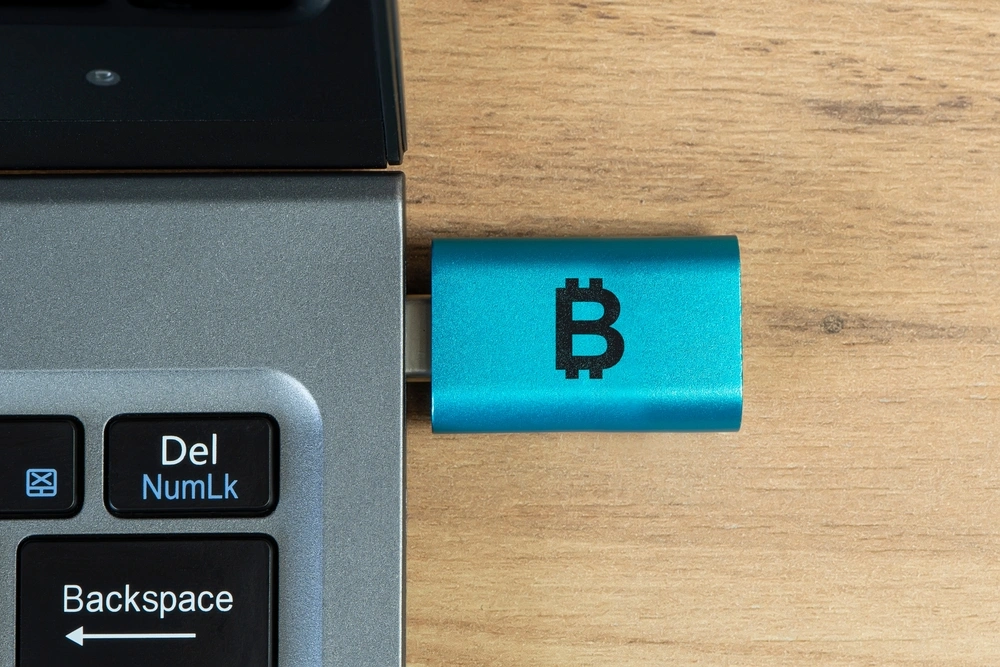|crypto, knowledgehub
What Are Hardware and Software Wallets?

As crypto and blockchain technology continue to grow exponentially, so too does the need for secure storage solutions, such as hardware and software wallets, for digital assets. Having a reliable crypto wallet is essential, regardless of your experience level in crypto trading.
Hardware crypto wallets store private keys for accessing and transacting digital assets, similar to USB drives. Software wallets can integrate them to transform hot storage into cold storage.
Software crypto wallets, on the other hand, are software programs used on digital devices and can be categorized into custodial and noncustodial. Custodial wallets have a third party managing cryptocurrencies, while noncustodial wallets allow users complete control.
In this guide, we will explore the differences between hardware and software crypto wallets, their key features and benefits, as well as tips on selecting the right option for your needs. Let’s continue!
How do hardware wallets work?
Hardware wallets connect to your computer via USB and display transactions on an integrated screen for confirmation with a button press. After entering a PIN, the device generates the wallet and stores private keys securely in its protected memory module, completely isolated from any internet connection.
The corresponding software wallet or exchange sends and receives funds, requiring only the hardware device to authorize outgoing transactions. Many also support multiple cryptocurrencies and offer seed phrases for simple fund restoration in the event of device loss or damage.
Advantages of hardware wallets
Hardware wallets keep private keys secure using an offline "cold storage" approach. Some of the key benefits of hardware wallets include:
- Secure offline key generation and storage prevent private keys from being hacked.
- Multiple layers of protection, like PIN codes, passwords, and physical buttons, make them more secure than software wallets.
- Compatible with many cryptocurrencies and work across different devices once setup.
- Provide peace of mind knowing your funds are safe from malware, viruses, or hackers targeting internet-connected devices.
- Easy-to-use interfaces guide you through transactions securely. Backup recovery seeds serve as an additional safeguard in the event of device loss or damage. You can check out “How to Recover and Secure a Crypto Wallet?” to learn more details.
- Hardware wallets offer arguably the highest level of security for crypto storage currently available.
How do software wallets work?
Software wallets store users' private keys on a computer or mobile device as part of a software program. To set up a software wallet, you simply download the app or program and follow the on-screen instructions to generate a new public or private key pair.
In contrast to hardware wallets, the software interface directly stores and controls the private keys on the device. When initiating transactions, the software wallet digitally signs them on the device using private keys without exposing them.
The software wallet then broadcasts the signed transactions to the blockchain. While convenient, this does introduce potential security vulnerabilities compared to hardware wallets, as private keys are internet-connected.
Advantages of software wallets
That said, software wallets do offer some benefits, such as:
- They are often free to download and use, making them more affordable than hardware wallets.
- It is easier and faster to set up without requiring additional hardware.
- Convenient app-based interfaces allow easier portfolio management on the go from any device.
- Support a wide type of cryptocurrencies without needing to install additional apps.
- It is good for beginners and smaller balances where the improved security of hardware wallets may not outweigh convenience.
- Some reputable software wallets take security very seriously and integrate good practices like two-factor authentication.
While less secure than hardware, software wallets are highly portable and cost-effective for low-risk cryptos, provided you practice safe security habits. To learn more about crypto wallets, you can check out “Types of Crypto Wallets” and “How to Set Up a Cryptocurrency Wallet?”.
Software vs. hardware wallets: What is the difference?
By now, it should be clear that hardware and software wallets differ primarily in their approach to security through either "hot" or "cold" storage of private keys—on an internet-connected device versus completely offline storage.
Here are other key differences between software and hardware wallets:
Security
Hardware wallets provide the gold standard of safety through cold storage and physical protection features, while software relies more on digital security best practices.
Accessibility
Software provides instant accessibility on any device, versus the need to physically connect a hardware wallet.
Setup complexity
Hardware typically requires more steps to initially configure and use properly compared to simple software wallet downloads.
Compatibility
Software generally works across more crypto coins and blockchains than specific hardware models.
Cost
Hardware wallet setup costs more upfront but has no ongoing transaction fees.
Hardware wallets are best for large holdings or very security-conscious users, while software works better for beginners, traders, or smaller balances where convenience trumps total security. Both have their place.
Are hardware wallets safer than software wallets?
When it comes to crypto storage, hardware wallets are generally considered the safest option available due to their completely "cold" storage of private keys offline and isolated from internet connectivity.
This makes them much harder for hackers to target compared to their software equivalents. Some statistics highlight how hardware better protects funds:
- According to Chainalysis, less than 0.1% of all cryptocurrency thefts in 2021 involved hardware wallets due to their secure design. You can check out “51% Attacks” to learn more details.
- In 2021, an ESET cybersecurity report discovered over 250 malware programs designed to steal cryptocurrency from software wallets. No major hardware-specific malware exists.
- Hackers prefer targeting exchange platforms and software wallets left online rather than tamper-proof hardware models. In 2022, hackers stole over $3 billion from DeFi protocols alone.
- Even in the rare cases of some hardware wallets being compromised, their backup recovery seed phrases still allow complete account restoration, unlike their software counterparts, which rely only on private keys.
To sum up, keeping private keys offline and separate from internet connectivity gives hardware wallets their reputation as basically "unhackable" given current technology, making them the safest long-term cold storage solution available for large crypto holdings.
Benefits of crypto wallets for businesses
Cryptocurrencies and blockchain continue to grow in popularity, not just for individual investors but also for businesses large and small. Crypto wallets provide a number of unique advantages for companies looking to accept digital currencies as payment or leverage blockchain applications.
Wallets offer businesses several main benefits.
Secure payments and settlements
Crypto wallets allow for instant, frictionless receipt and storage of crypto payments from customers around the world.
Lower fees
Processing crypto transactions typically costs businesses much less than credit cards, saving 1–4% per transaction.
New markets
Accepting popular coins opens companies up to the over 300 million global crypto users who transact over $2 trillion annually.
Integrations
Solutions like Cryptobunq, the crypto service leader with over $100 billion secured, offer seamless custody and wallet integrations with accounting and POS systems.
New business models
Wallets facilitate innovative uses of blockchain, like smart contracts, digital provenance tracking, and supply chain optimization.
Cryptocurrency wallets provide businesses with a low-cost, global digital payment solution while positioning them to harness emerging blockchain applications. With secure WaaS providers such as Cryptobunq, you can easily integrate the benefits of crypto wallets into your projects.
CBQ is an expert one-stop shop crypto service provider that offers numerous other services such as crypto exchange API, crypto checkout and invoicing, batch crypto payments, and more. To learn more about our solutions, make sure to check out our case studies!
Should you use a hardware or software wallet for your digital assets?
By now, we have examined in-depth the differences between hardware vs. software wallets and their various pros and cons. But how do you decide which is best for your needs? Here are some definitive tips:
- Use a hardware wallet if you have over $1000 worth of crypto, and prioritize long-term security above all else.
- For balances under $1000, a software wallet provides an excellent blend of security and usability. Be careful with your keys.
- A software wallet improves accessibility and portfolio management for daily trading or short-term holding.
- For bigger institutional players, Cryptobunq's insured custodial services provide enterprise-grade security for multi-million dollar holdings.
- Always consider buying directly from the manufacturer to avoid tampered hardware wallets and enable warranty coverage.
- Hardware for long-term HODLing, software for activity, and exchanges for stablecoins.
- It is important to choose based on your unique needs.
The bottom line
We hope this guide has helped explain the differences between hardware and software wallets and how they securely store cryptocurrencies. Whether you decide on a hardware wallet or a software wallet, keeping your digital assets safe should always be your top priority.
With so many wonderful services offered by Cryptobunq, like crypto wallets and crypto custody solutions for businesses, crypto adoption continues to become more accessible and reliable each year.
Feel free to explore all that Cryptobunq has to offer and start taking advantage of today's incredible world of digital currency. Contact us and start taking advantage of CBQ's secure crypto and blockchain services!













